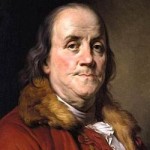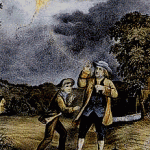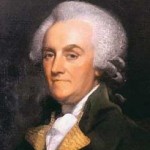Historical Drama — Single Set — 5 Men, 2 Women
Commissioned By: Utah Shakespearen Festival
Description: With war imminent, Governor William Franklin must choose between Father Benjamin and Father Britain. Fearing that the rebels will hang, he sides with Britain – and destroys his life.
Synopsis: William Franklin’s career is on target. Thanks to his exemplary military service during the French and Indian War and his famous father’s connections, he has become the Royal Governor of New Jersey. He is also married to Elizabeth, the beautiful daughter of a wealthy plantation owner. And perhaps best of all, he is a partner in his father’s ambition to wrest control of Pennsylvania from the Penn family.
Then Parliament passes the Stamp Act. Despite Ben’s assertions that the colonies should bear this burden, open rebellion nearly breaks out. William skillfully keeps New Jersey out of the fray, but privately feels that the Stamp Act rebels are selfish fools. Back in London, however, Ben gradually grows disgusted with British rule. When he is publicly humiliated in Parliament, Benjamin becomes a Patriot and sails home.
Ben tries to convince William to join the rebels, but the governor refuses to help a cause that would shatter the British Empire. On July 4th, 1776, the rebels imprison William, and his once stable world completely falls apart. Father and son are now on opposite sides, and their fight mirrors the war itself.
Why It Was Written: I was exploring an encyclopedia CD, and I was reading the Ben Franklin article. At the end of it, there was a tiny entry about William Franklin, and it went something like this: William Franklin. Benjamin’s Franklin’s oldest son. Royal Governor of New Jersey. President of the American Loyalists. Exiled to England after the Revolutionary War. My mind popped! Who was this guy, and why did he, of all people, oppose Ben Franklin during the war?
Fast forward a few years, and 9/11 horribly changed our world. There was a lot of talk about patriotism and I thought about William Franklin again. I found the reason to write the play, because William believed he was the true patriot, trying to preserve the British Empire. Meanwhile my UNLV mentor, Jerry L. Crawford, invited me to submit proposals to be the Playwright-in-Residence at the Utah Shakespearean Festival. It was the perfect year to pitch the project, as the festival was producing the musical 1776. So I spent much of August in Utah developing the play with George Judy, the Plays-in-Progress director, and our cast had actors from the 1776 production.
The staged readings were the largest I’ve ever had for a play, easily over a hundred people at both performances. One audience member turned out to be a retired official from the United Nations, and he introduced me via email to Walter Isaacson, author of the recent Benjamin Franklin biography (and since then, Einstein and Steve Jobs). Mr. Isaacson helped me iron out some parts of the history I was unsure about, and he introduced me via email to Sheila L. Skemp, whose book, William Franklin, was one of my main sources for the play. Their advice and criticism was very helpful, and by the end of the year I had a polished script. And you can read it, all you have to do is ask.
Excerpt Published In: The Playwrights’ Center: Monologues for Men
Read the First Ten Pages: Script Sample



